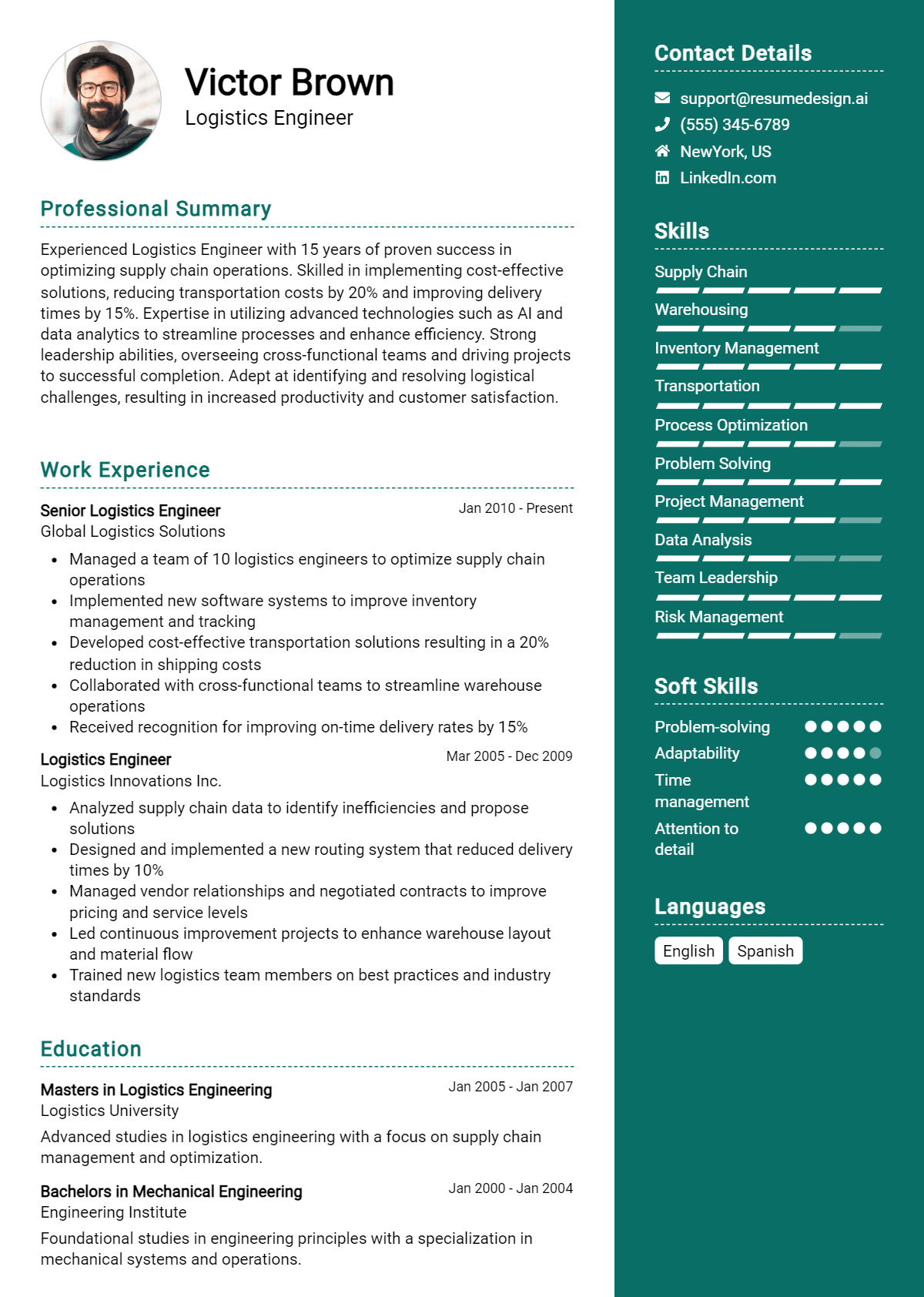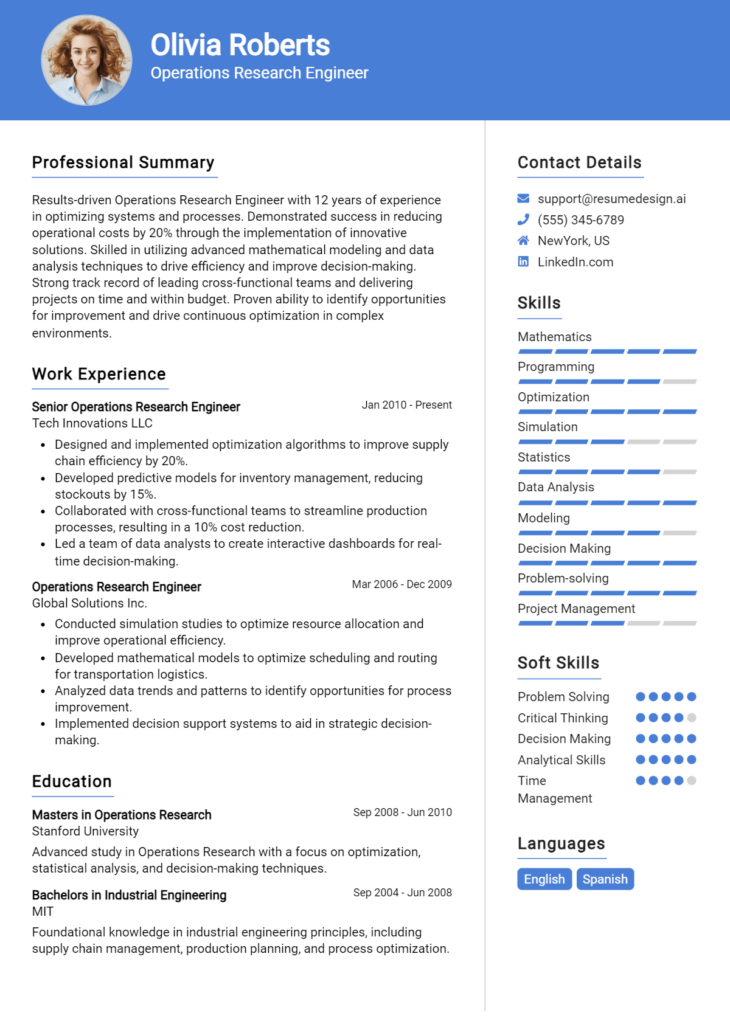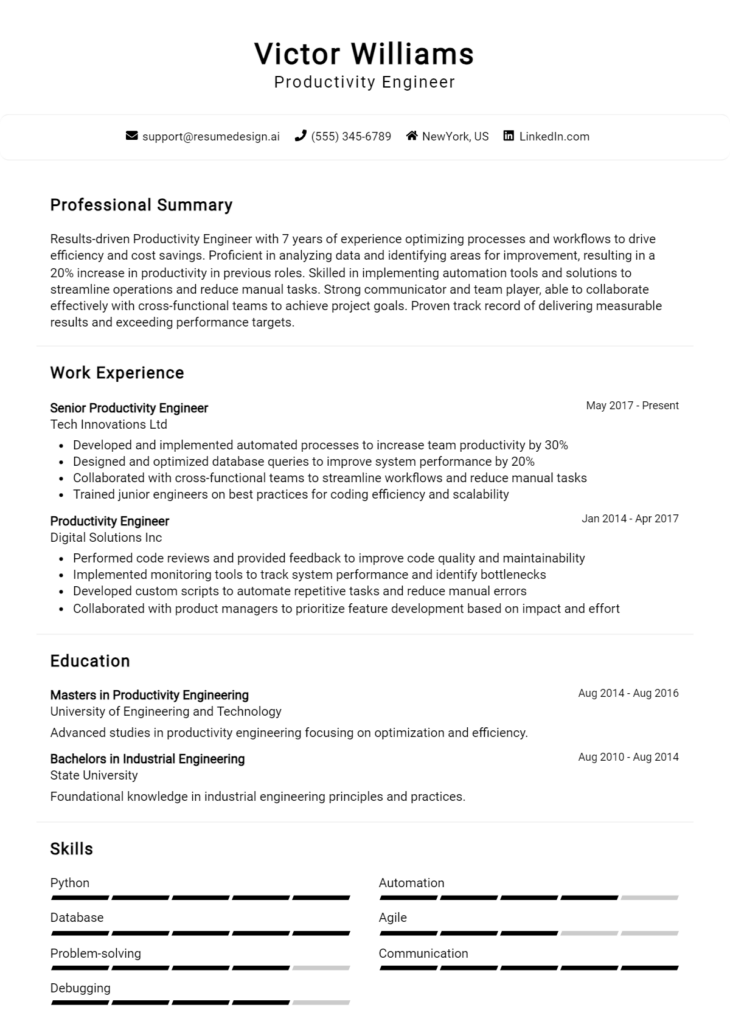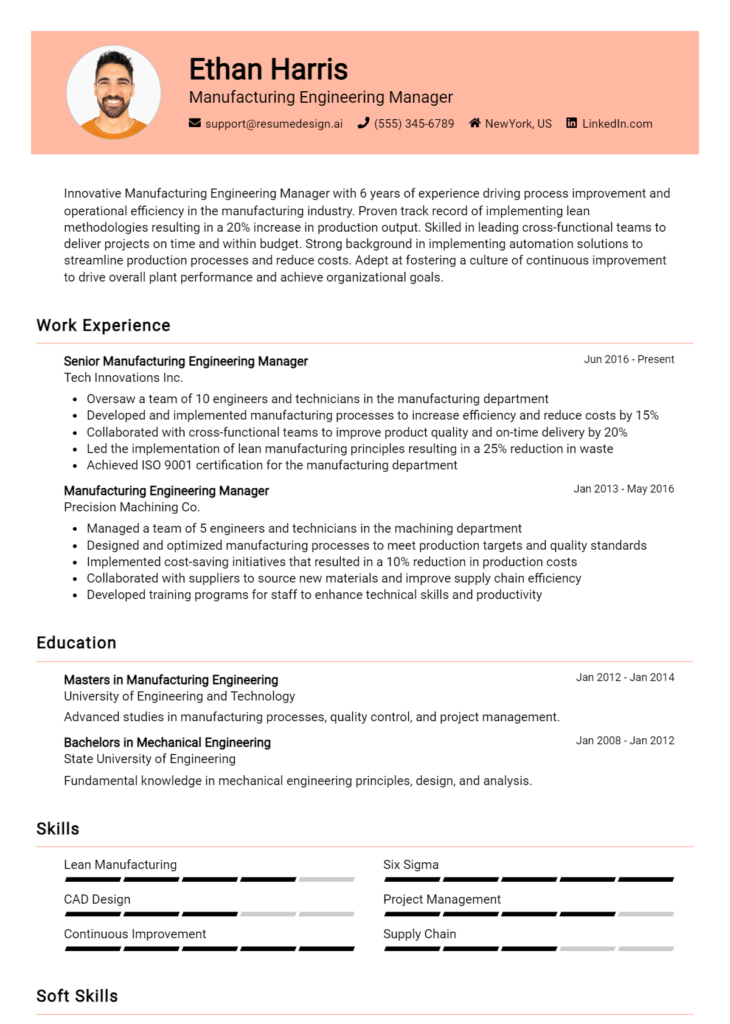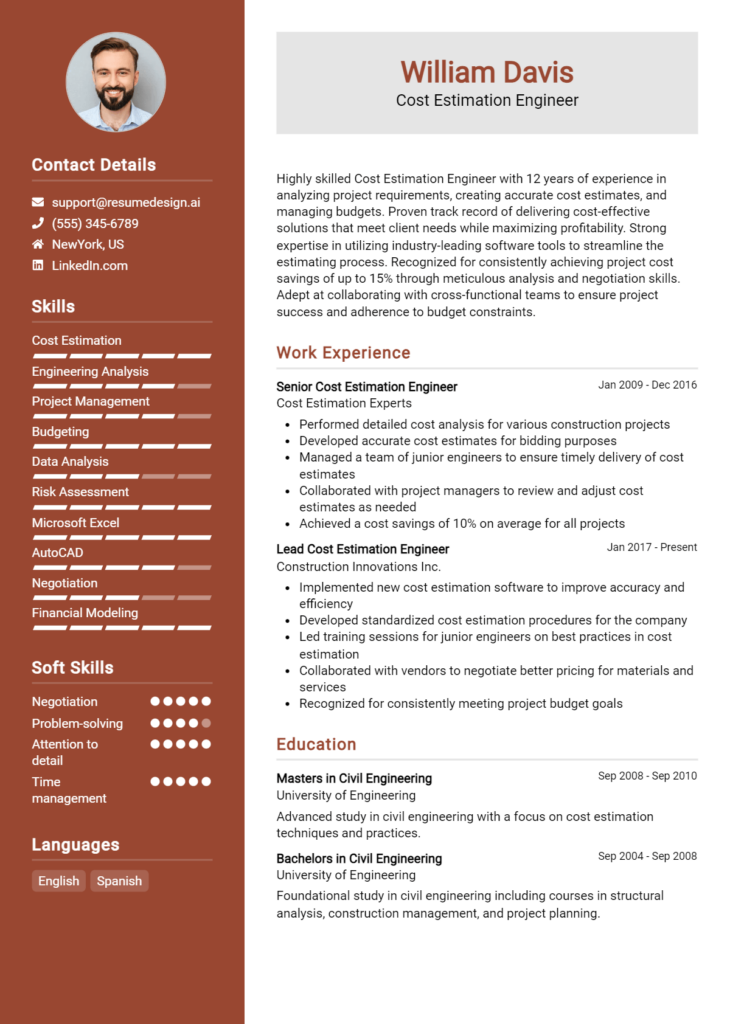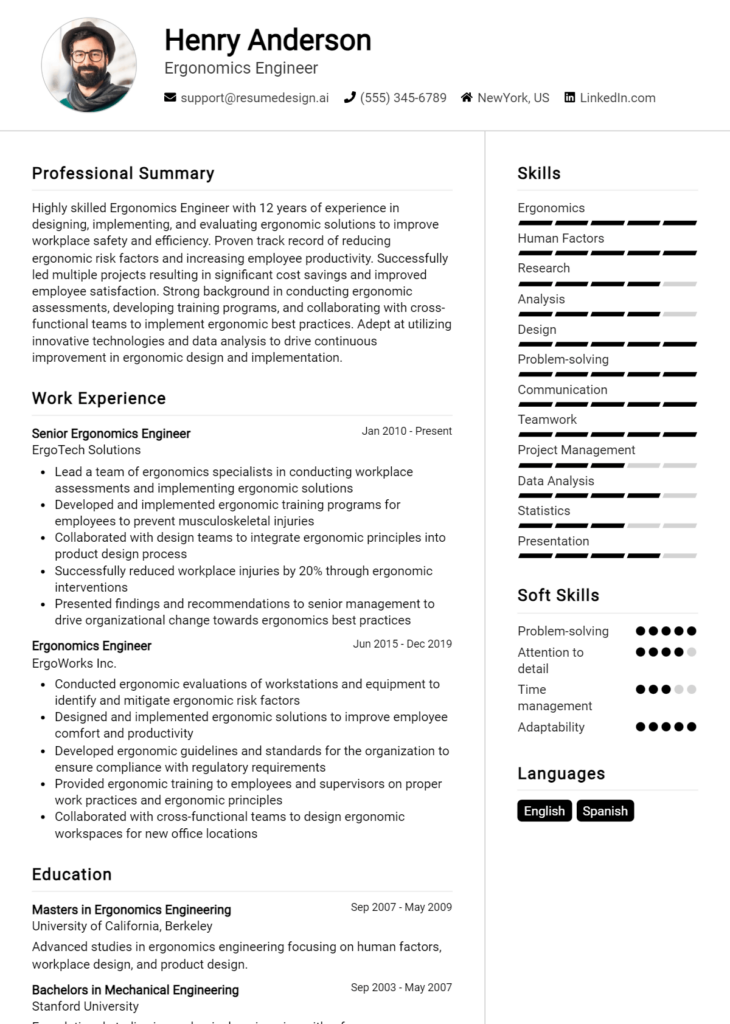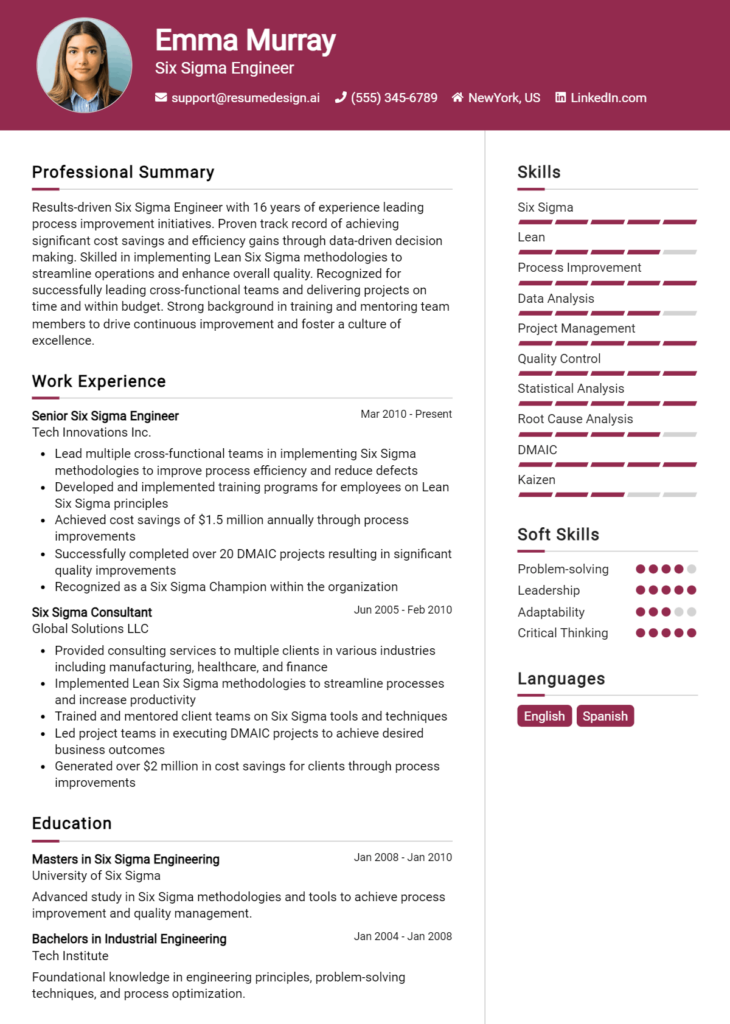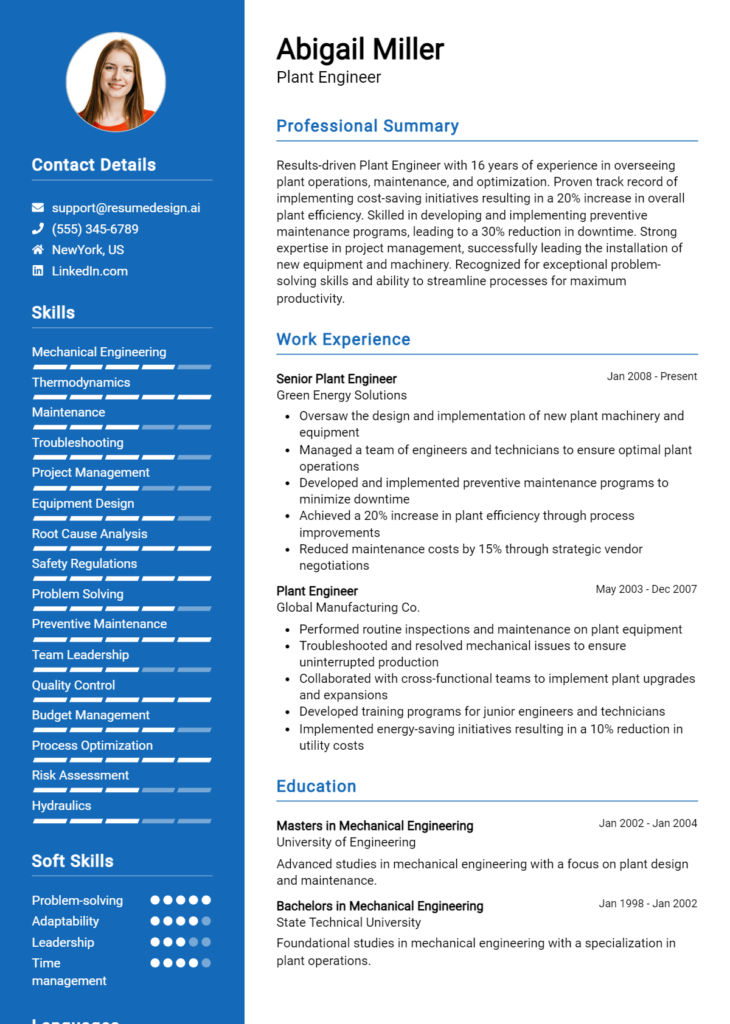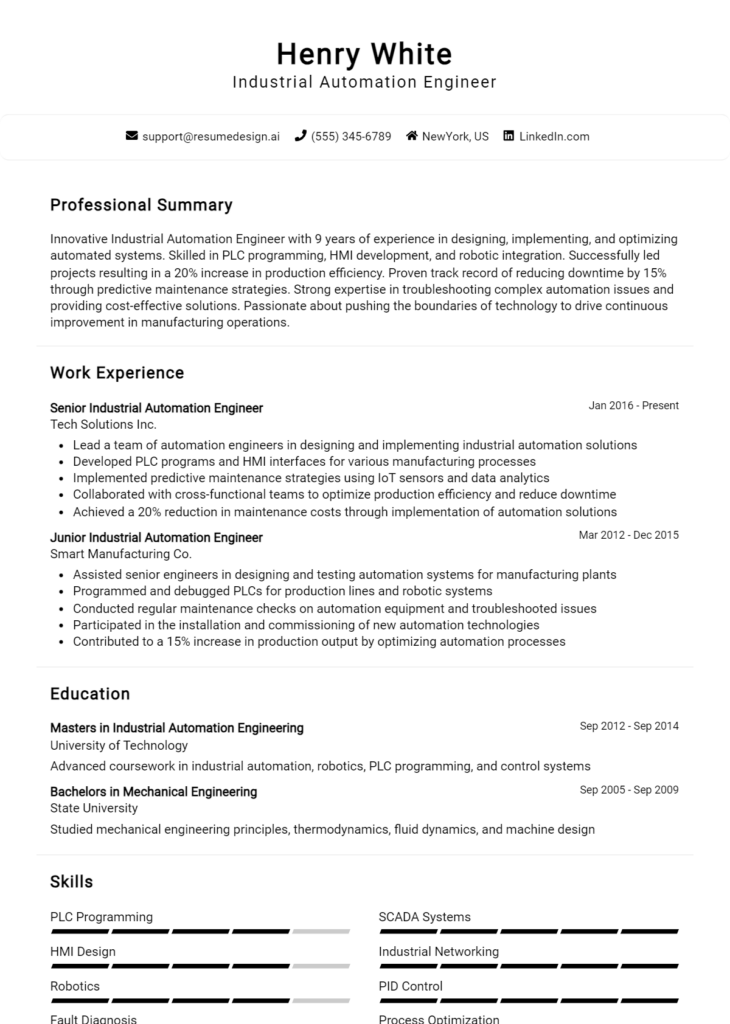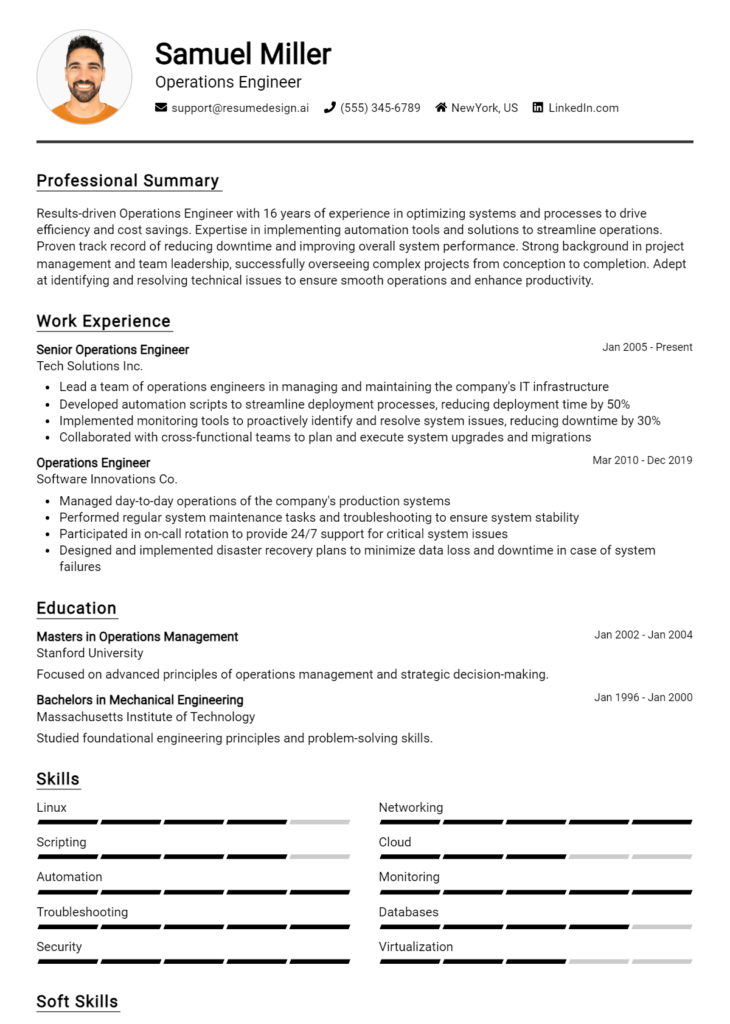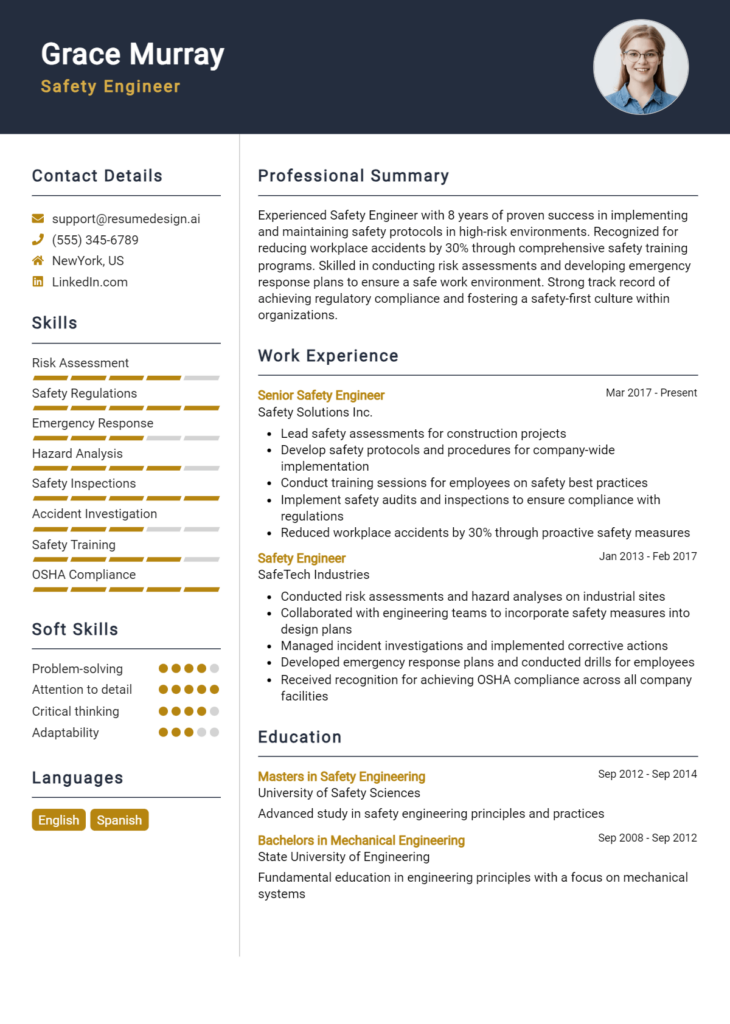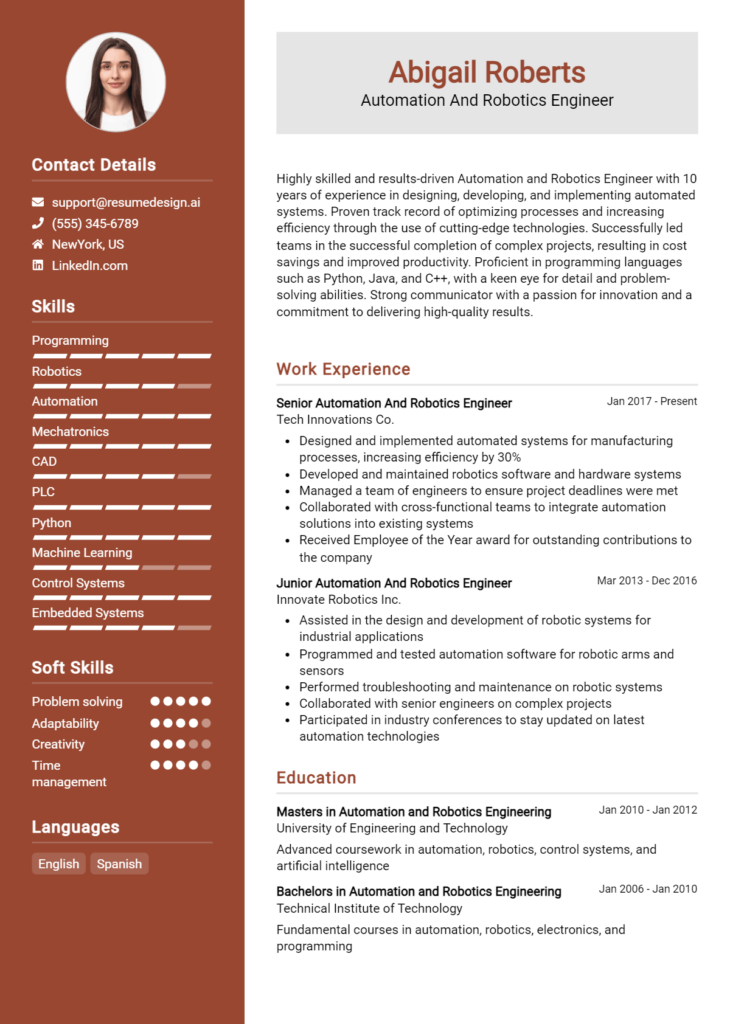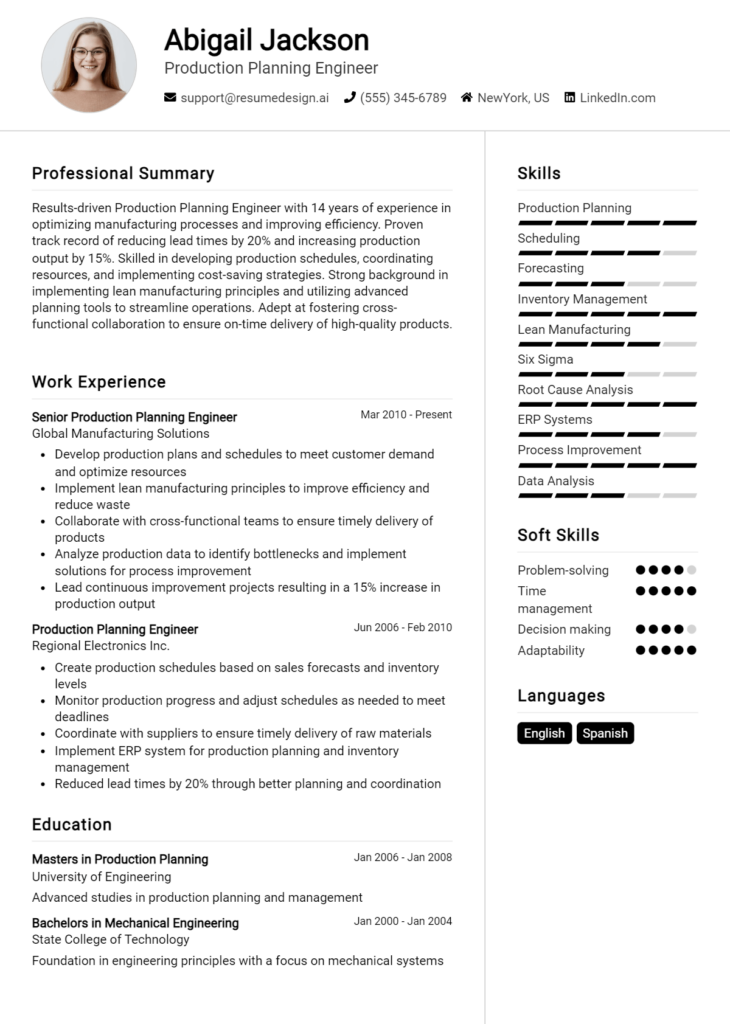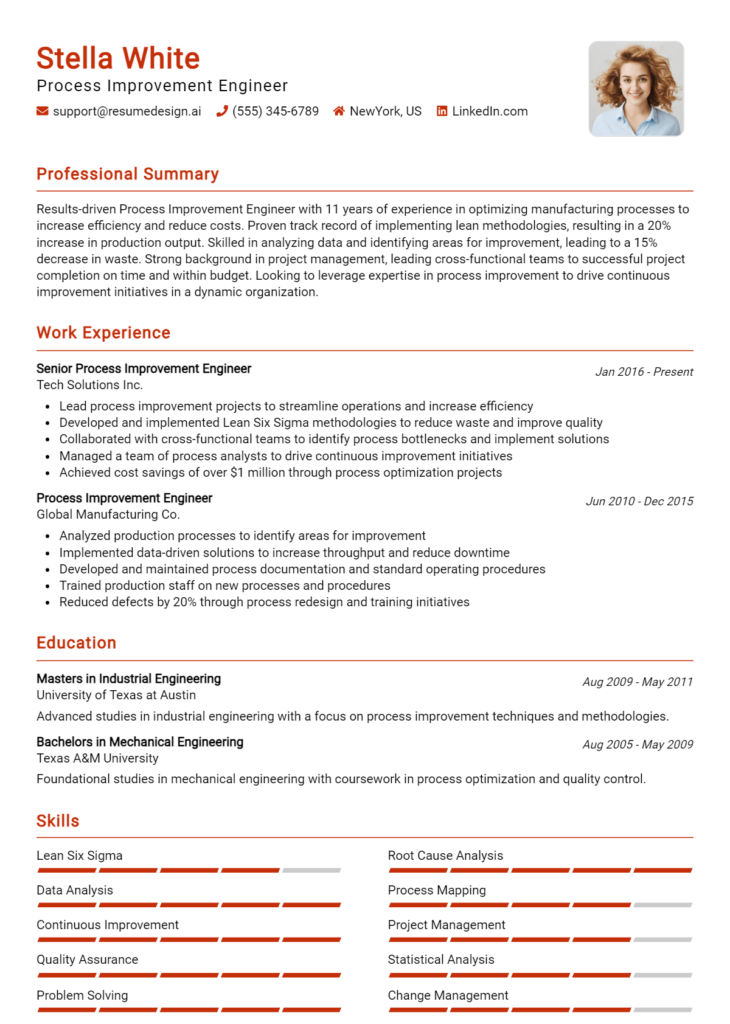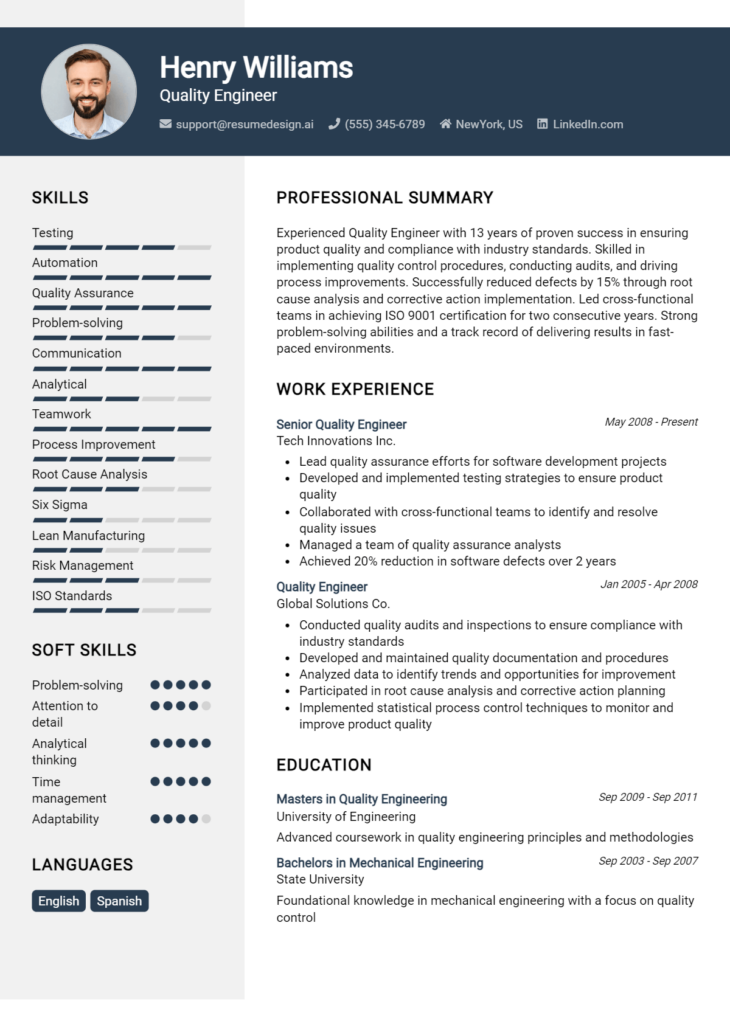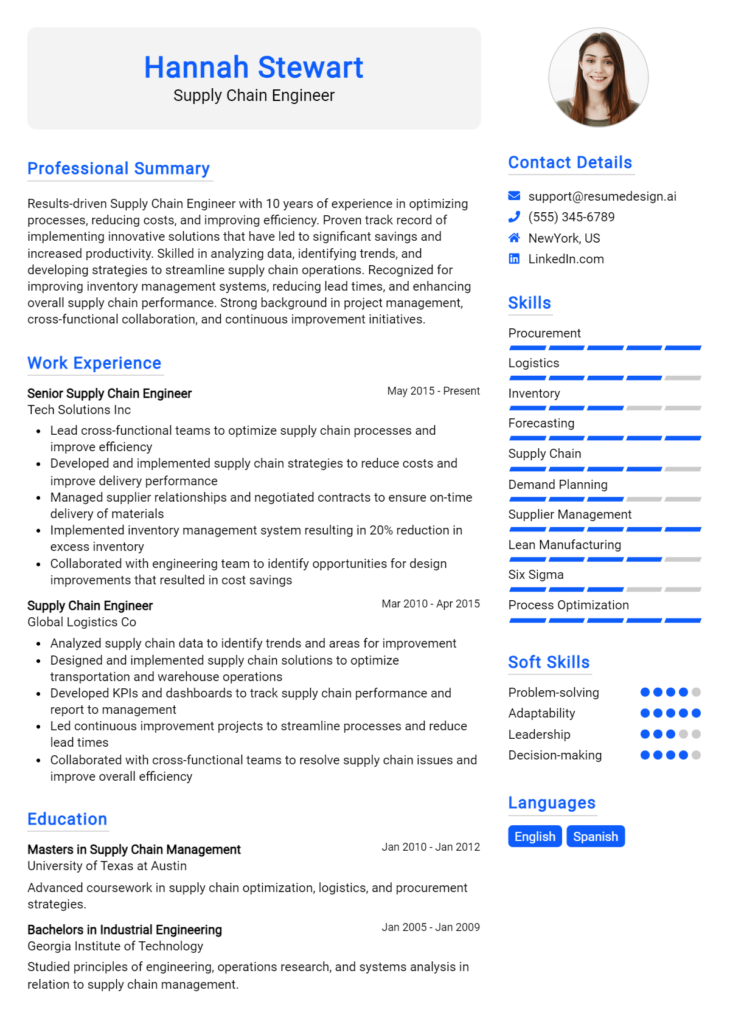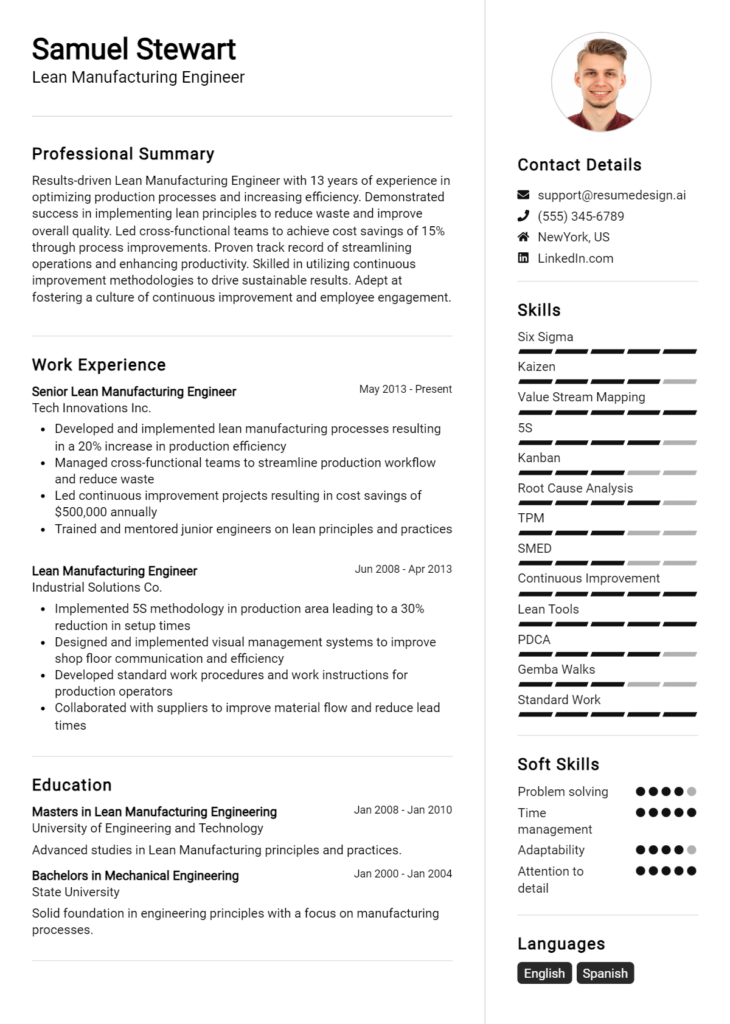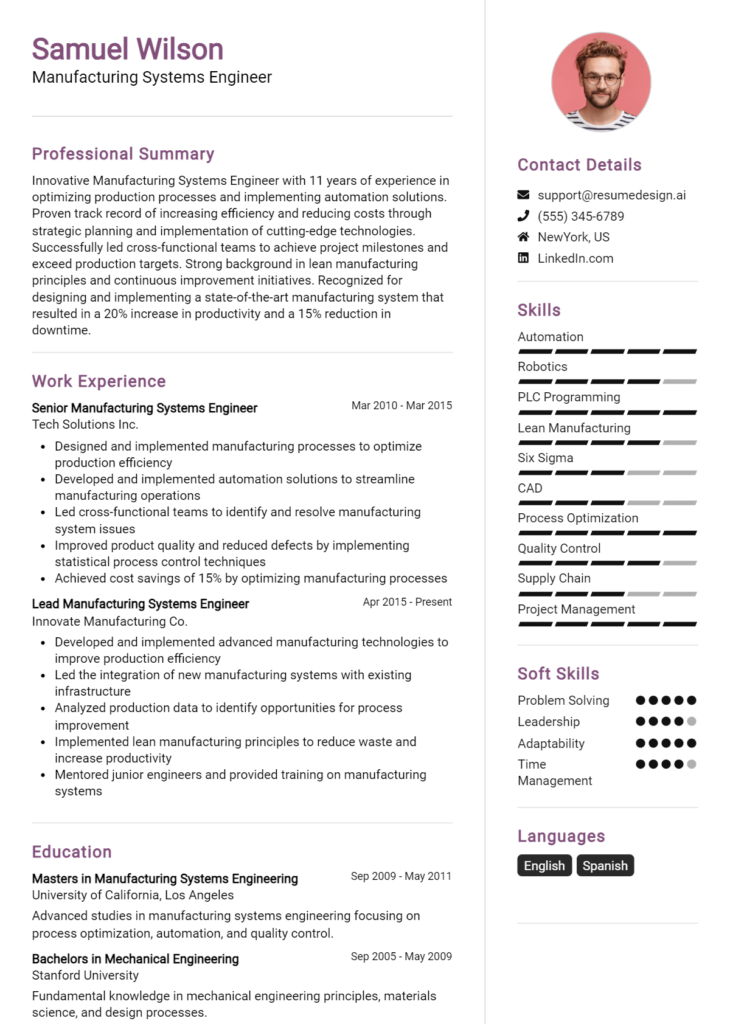Logistics Engineer Core Responsibilities
A Logistics Engineer plays a crucial role in optimizing supply chain processes by bridging various departments, including procurement, production, and distribution. Key responsibilities include analyzing logistics systems, designing efficient transportation networks, and implementing cost-saving strategies. Essential skills involve technical expertise in logistics software, operational understanding of supply chain dynamics, and strong problem-solving abilities. These competencies are vital for achieving organizational goals, and a well-structured resume can effectively highlight these qualifications, ensuring candidates stand out in a competitive job market.
Common Responsibilities Listed on Logistics Engineer Resume
- Develop and optimize logistics processes and systems.
- Conduct data analysis to improve operational efficiency.
- Coordinate with suppliers and vendors for timely deliveries.
- Design and implement warehouse management solutions.
- Evaluate transportation options for cost-effectiveness.
- Monitor inventory levels and manage stock replenishment.
- Collaborate with cross-functional teams to align logistics strategies.
- Identify and resolve supply chain issues proactively.
- Create logistics performance metrics and reports.
- Ensure compliance with industry regulations and standards.
- Utilize logistics software for tracking and analysis.
- Facilitate training for staff on logistics best practices.
High-Level Resume Tips for Logistics Engineer Professionals
In today's competitive job market, a well-crafted resume is crucial for Logistics Engineer professionals looking to make a lasting impression on potential employers. Your resume serves as the first point of contact, and it needs to effectively showcase not only your skills but also your achievements in the field. It’s your opportunity to highlight your expertise in optimizing supply chain processes, improving logistics operations, and implementing innovative solutions. This guide will provide practical and actionable resume tips specifically tailored for Logistics Engineer professionals, ensuring you stand out in a crowded applicant pool.
Top Resume Tips for Logistics Engineer Professionals
- Tailor your resume to each job description by incorporating relevant keywords and phrases that align with the specific requirements of the position.
- Highlight your experience with logistics software and tools, such as ERP systems, TMS, and WMS, to demonstrate your technical proficiency.
- Quantify your achievements with specific metrics, such as cost savings, efficiency improvements, or project completion timelines, to provide concrete evidence of your impact.
- Showcase relevant certifications, such as APICS CPIM or Six Sigma, to validate your expertise and commitment to professional development.
- Include a dedicated section for key skills, focusing on industry-specific competencies such as inventory management, supply chain optimization, and project management.
- Utilize action verbs to describe your responsibilities and accomplishments, making your contributions sound dynamic and impactful.
- Keep your format clean and professional, ensuring easy readability with clear headings and bullet points to guide the reader through your experience.
- Incorporate a summary or objective statement at the top of your resume that succinctly outlines your career goals and key qualifications.
- Highlight your ability to work in cross-functional teams and communicate effectively with stakeholders to emphasize your collaborative skills.
By implementing these tips, you can significantly enhance your resume's effectiveness, increasing your chances of landing a job in the Logistics Engineer field. A well-structured resume that effectively conveys your skills and achievements can set you apart from other candidates, making you a more attractive prospect to potential employers.
Why Resume Headlines & Titles are Important for Logistics Engineer
In the competitive field of logistics engineering, a resume headline or title serves as the first impression a hiring manager has of a candidate. A strong headline can effectively capture attention and provide a succinct summary of a candidate’s key qualifications, making it easier for employers to identify suitable applicants quickly. By incorporating relevant skills, experience, or achievements, a well-crafted title can convey the candidate's value in just a few words. It is vital that these headlines are concise, relevant, and directly aligned with the specific job being applied for, ensuring they resonate with the expectations of potential employers.
Best Practices for Crafting Resume Headlines for Logistics Engineer
- Keep it concise: Aim for a brief headline that communicates your expertise in a few words.
- Be role-specific: Tailor your headline to reflect the specific logistics engineering position you are applying for.
- Highlight key qualifications: Mention critical skills or experiences relevant to the job description.
- Use impactful language: Choose powerful words that convey confidence and expertise.
- Avoid jargon: Ensure your headline is clear and easily understood by all hiring managers.
- Focus on achievements: If possible, include a quantifiable achievement to demonstrate your impact.
- Stay professional: Maintain a formal tone that reflects the industry standards.
- Revise and refine: Regularly update your headline to match your most recent experiences and skills.
Example Resume Headlines for Logistics Engineer
Strong Resume Headlines
Results-Driven Logistics Engineer with 5+ Years of Experience in Supply Chain Optimization
Innovative Logistics Engineer Specializing in Lean Methodologies and Process Improvement
Certified Logistics Engineer with Proven Track Record in Reducing Costs and Enhancing Efficiency
Dynamic Logistics Engineer Focused on Streamlining Operations and Delivering Results
Weak Resume Headlines
Logistics Engineer
Experienced Professional Seeking Opportunities
Strong headlines are effective because they immediately communicate the candidate's unique value proposition and relevant experience, making it easy for hiring managers to see why they are a suitable fit for the position. In contrast, weak headlines fail to impress as they lack specificity and do not provide any insight into the candidate's qualifications or accomplishments. By avoiding generic titles, candidates can stand out and captivate the attention of potential employers from the outset.
Writing an Exceptional Logistics Engineer Resume Summary
A well-crafted resume summary is crucial for a Logistics Engineer as it serves as the first impression on hiring managers, allowing them to quickly assess the candidate's qualifications. A strong summary succinctly highlights key skills, relevant experience, and notable accomplishments that align with the job role. This focused introduction not only captures attention but also sets the tone for the rest of the resume. By being concise and impactful, a tailored resume summary effectively communicates to potential employers why the candidate is the ideal fit for the position.
Best Practices for Writing a Logistics Engineer Resume Summary
- Quantify achievements: Use numbers and metrics to demonstrate the impact of your work.
- Focus on relevant skills: Highlight technical skills and tools pertinent to logistics engineering.
- Tailor the summary: Customize your summary to align with the specific job description and requirements.
- Keep it concise: Aim for 2-4 sentences that deliver your key points effectively.
- Use action verbs: Start sentences with strong verbs to convey a sense of initiative and accomplishment.
- Showcase industry knowledge: Mention familiarity with logistics processes, regulations, or technologies.
- Highlight collaboration: Emphasize teamwork and cross-functional collaboration in logistics projects.
- Include certifications: If applicable, reference relevant certifications or training in logistics and supply chain management.
Example Logistics Engineer Resume Summaries
Strong Resume Summaries
Results-driven Logistics Engineer with over 6 years of experience optimizing supply chain processes, achieving a 20% reduction in delivery times through strategic route planning and vendor negotiations.
Detail-oriented Logistics Engineer skilled in utilizing Lean Six Sigma methodologies to streamline operations, leading to a 30% decrease in operational costs while enhancing service delivery across multiple projects.
Innovative Logistics Engineer with a proven track record of implementing advanced inventory management systems, successfully increasing inventory accuracy by 25% and reducing stock shortages in a high-volume warehouse environment.
Weak Resume Summaries
Experienced in logistics and supply chain management with a focus on improving processes.
Logistics Engineer with various skills looking for opportunities to contribute to a team.
The examples provided illustrate the characteristics of strong and weak resume summaries. Strong summaries are specific, quantifying achievements and showcasing relevant skills that directly relate to the logistics engineering role. They highlight measurable outcomes and demonstrate the candidate's impact on previous employers. In contrast, weak summaries lack detail, offer vague descriptions of experience, and do not effectively communicate the candidate's value or relevance to the job, making it difficult for hiring managers to gauge their suitability for the position.
Work Experience Section for Logistics Engineer Resume
The work experience section of a Logistics Engineer resume is vital as it serves as a showcase for the candidate's technical skills, management capabilities, and commitment to delivering high-quality products. This section provides concrete evidence of a candidate's expertise in logistics processes, supply chain management, and project execution. By quantifying achievements and aligning experiences with industry standards, candidates can effectively demonstrate their ability to contribute to operational efficiency and drive results within an organization.
Best Practices for Logistics Engineer Work Experience
- Use action verbs to describe your responsibilities and achievements.
- Quantify results whenever possible (e.g., percentage improvements, cost savings).
- Highlight specific technical skills relevant to logistics engineering.
- Emphasize collaborative projects and teamwork experience.
- Tailor your experience to align with the job description and industry standards.
- Include certifications and relevant training that enhance your qualifications.
- Demonstrate problem-solving abilities with examples of challenges faced and solutions implemented.
- Keep descriptions concise while maintaining clarity and detail.
Example Work Experiences for Logistics Engineer
Strong Experiences
- Led a cross-functional team to redesign the supply chain process, resulting in a 30% reduction in delivery times and a 15% decrease in operational costs.
- Implemented a new inventory management system that improved accuracy by 25% and reduced excess stock by 40%, enhancing overall inventory turnover.
- Coordinated with vendors to optimize transportation logistics, achieving a 20% cost reduction while maintaining service quality and delivery reliability.
- Developed and executed a logistics training program for staff, improving team efficiency by 35% and increasing employee retention by 50% over two years.
Weak Experiences
- Responsible for logistics tasks and some project management duties.
- Worked on improving processes without specific outcomes or measurable results.
- Assisted in team meetings and contributed to discussions.
- Involved in inventory management but did not track improvements or efficiencies.
The examples provided highlight the distinction between strong and weak experiences. Strong experiences are characterized by clear, quantifiable outcomes and demonstrate leadership and collaboration, showcasing the candidate's value to potential employers. In contrast, weak experiences lack specificity, measurable results, and fail to convey the candidate's impact, making them less compelling to hiring managers.
Education and Certifications Section for Logistics Engineer Resume
The education and certifications section of a Logistics Engineer resume is crucial for showcasing the candidate's academic achievements and professional qualifications. This section not only highlights the candidate's formal education but also underscores their commitment to continuous learning through industry-relevant certifications. By providing details about specialized training and relevant coursework, candidates can greatly enhance their credibility and demonstrate their alignment with the logistics engineering role. Employers often seek candidates with a solid educational foundation and a proactive approach to professional development, making this section a vital component of the resume.
Best Practices for Logistics Engineer Education and Certifications
- List the most relevant degrees first, such as a Bachelor’s or Master’s in Logistics, Supply Chain Management, or Industrial Engineering.
- Include any industry-recognized certifications, such as Certified Supply Chain Professional (CSCP) or Certified in Production and Inventory Management (CPIM).
- Highlight relevant coursework that demonstrates specific skills or knowledge applicable to logistics engineering.
- Use clear and concise language to describe your educational background and certifications.
- Ensure that all qualifications are up-to-date and reflect current industry standards.
- Consider including any specialized training sessions or workshops attended that relate to logistics and supply chain optimization.
- Maintain a chronological order, listing the most recent qualifications at the top of the section.
- Be selective in your entries; only include information that adds value to your application for the logistics engineer role.
Example Education and Certifications for Logistics Engineer
Strong Examples
- Bachelor of Science in Logistics and Supply Chain Management, University of XYZ, 2021
- Certified Supply Chain Professional (CSCP), APICS, 2022
- Master’s Certificate in Project Management, ABC University, 2023
- Relevant Coursework: Transportation Systems, Inventory Management, and Operations Research.
Weak Examples
- Bachelor of Arts in History, University of ABC, 2015
- Certification in Basic Microsoft Office, 2019
- High School Diploma, XYZ High School, 2010
- Coursework: Introduction to Art History.
The strong examples listed above are considered effective because they are directly relevant to the logistics engineering field, showcasing degrees, certifications, and coursework that align with industry expectations. These qualifications not only reflect the candidate's educational background but also their ongoing commitment to professional development. In contrast, the weak examples lack relevance, as they include outdated or unrelated degrees and certifications that do not demonstrate the necessary skills or knowledge pertinent to logistics engineering. This distinction emphasizes the importance of tailoring the education and certifications section to the specific job role.
Top Skills & Keywords for Logistics Engineer Resume
In the competitive field of logistics engineering, a well-crafted resume is crucial for standing out among potential employers. Highlighting the right skills is essential, as they not only demonstrate your technical proficiency but also showcase your ability to adapt and thrive in a dynamic work environment. A robust blend of soft and hard skills can significantly enhance your resume, making it more appealing to hiring managers. By carefully choosing and presenting these skills, you can effectively convey your qualifications and readiness for the challenges of a logistics engineering role.
Top Hard & Soft Skills for Logistics Engineer
Soft Skills
- Problem-solving
- Communication
- Teamwork and collaboration
- Adaptability
- Critical thinking
- Time management
- Attention to detail
- Leadership
- Negotiation skills
- Customer service orientation
Hard Skills
- Supply chain management
- Inventory control
- Data analysis and interpretation
- Project management
- Proficiency in logistics software (e.g., SAP, Oracle)
- Quality assurance techniques
- Transportation management
- Cost analysis
- Regulatory compliance knowledge
- Geographic Information Systems (GIS)
For further guidance on how to effectively incorporate skills into your resume and highlight relevant work experience, consider exploring additional resources that can provide you with valuable insights and examples.
Stand Out with a Winning Logistics Engineer Cover Letter
Dear [Hiring Manager's Name],
I am writing to express my interest in the Logistics Engineer position at [Company Name] as advertised on [where you found the job listing]. With a robust background in supply chain optimization and a proven record of implementing innovative logistics solutions, I am excited about the opportunity to contribute to your team. My experience in analyzing and improving logistics processes aligns well with your company's commitment to excellence and efficiency.
In my previous role at [Previous Company Name], I successfully led a project that restructured the transportation network, resulting in a 25% reduction in shipping costs and a 15% improvement in delivery times. By employing data-driven analysis and cross-functional collaboration, I was able to identify bottlenecks in the supply chain and implement effective solutions. My proficiency in logistics software and tools, combined with my strong analytical skills, enables me to optimize operations while maintaining the highest standards of service.
I am particularly drawn to [Company Name] due to its innovative approach to logistics and commitment to sustainability. I am eager to leverage my expertise in process improvement and project management to support your goals. I believe that my technical skills, alongside my passion for continuous improvement, will make me a valuable asset to your team.
Thank you for considering my application. I look forward to the opportunity to discuss how my experience and vision align with the needs of [Company Name]. I am excited about the possibility of contributing to your esteemed organization and helping drive your logistics operations to new heights.
Sincerely,
[Your Name]
[Your Phone Number]
[Your Email Address]
Common Mistakes to Avoid in a Logistics Engineer Resume
When crafting a resume for a Logistics Engineer position, it's essential to highlight your skills and experiences effectively. However, many candidates fall into the trap of common pitfalls that can undermine their chances of landing an interview. Avoiding these mistakes can significantly enhance the clarity and impact of your resume, showcasing your qualifications in the best light possible.
Vague Job Descriptions: Using generic terms without specific details about your responsibilities and achievements can make your experience seem less impactful. Be sure to quantify your contributions where possible.
Ignoring Keywords: Failing to include relevant keywords from the job description can lead to your resume being overlooked by Applicant Tracking Systems. Tailor your resume to match the language used in the job posting.
Overly Technical Jargon: While it's important to demonstrate technical expertise, using too much industry jargon can alienate recruiters who may not be familiar with all the terms. Strive for a balance that showcases your knowledge without overwhelming the reader.
Lack of Focus on Soft Skills: Logistics Engineering is not just about technical skills; communication, problem-solving, and teamwork are also critical. Neglecting to highlight these soft skills can give an incomplete picture of your capabilities.
Unorganized Format: A cluttered or disorganized resume can make it difficult for hiring managers to find key information. Use clear headings, bullet points, and consistent formatting to improve readability.
Failing to Tailor Each Application: Sending the same resume to multiple employers can be detrimental. Tailor your resume for each specific job application to align your skills and experiences with the employer's needs.
Neglecting Professional Development: Not including relevant certifications, training, or continuing education can suggest a lack of commitment to professional growth. Make sure to highlight any ongoing learning or certifications that pertain to logistics or engineering.
Excessive Length: A resume that is too long can deter potential employers. Aim for a concise document, ideally one page, that captures all crucial information without unnecessary detail.
Conclusion
As we conclude our exploration of the Logistics Engineer role, it's essential to emphasize the critical skills and qualifications that make a standout candidate in this competitive field. We've discussed the importance of technical expertise in supply chain management, proficiency in logistics software, and strong analytical capabilities. Additionally, effective communication and problem-solving skills are vital for collaborating with various stakeholders and optimizing logistics operations.
Given the dynamic nature of the logistics industry, it’s crucial to ensure that your resume reflects your abilities and experiences accurately. A well-crafted resume not only highlights your qualifications but also positions you as an ideal candidate for potential employers.
Now is the perfect time to review your Logistics Engineer resume and make any necessary updates. Utilize available resources to enhance your application materials:
- Explore a variety of resume templates that can help showcase your skills and experience effectively.
- Try out the resume builder to create a polished document with ease.
- Look through resume examples to gain inspiration and see how others in your field present their qualifications.
- Don’t forget the significance of a strong application; check out our cover letter templates to complement your resume.
Take action today, and make sure your resume reflects the best version of your professional self!

